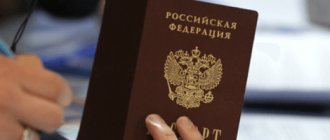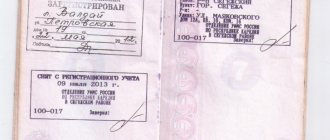Registration and registration - a fundamental difference
The word “propiska” itself is used only in everyday life; it has been firmly established in the colloquial language since the times of the Soviet Union, when registration was a mandatory condition for a citizen to live in a certain territory. But from a legal point of view, at the moment such a concept no longer exists.
Conclusion of the Committee of Constitutional Supervision of the USSR dated October 26, 1990 No. 11 (2-1) “On legislation on issues of registration of citizens” and then Conclusion of the Committee of Constitutional Supervision of the USSR dated October 11, 1991 No. 26 (2-1) “On the licensing procedure registration of citizens”, it was recognized that the provisions on registration, obliging citizens to obtain permission from internal affairs bodies or other government bodies to reside in all settlements on the territory of the USSR, limit the right of citizens to freedom of movement and freedom to choose their place of residence.
Registration in Russia was formally abolished on October 1, 1993
since the entry into force of the Law of the Russian Federation of June 25, 1993 No. 5242-1 “On the right of citizens of the Russian Federation to freedom of movement, choice of place of stay and residence within the Russian Federation.” Nowadays registration does not officially exist in Russia; it has been replaced by the concept of registration.
At the same time, as the legislator justifies, these institutions have a fundamental difference: registration was a kind of permission to reside in a certain territory, while registration is of a notification nature
.
At the same time, in essence, registration is the responsibility of a citizen, and not his right, since the law states that citizens of the Russian Federation are required to register at their place of stay and place of residence within the Russian Federation within the time limits established by law.
Fulfillment of this obligation is ensured, not least by administrative measures.
, living at the place of residence and at the place of stay without registration may entail the imposition of an administrative fine on citizens in the amount of two thousand to three thousand rubles; for tenants, owners of residential premises (individuals) - from two thousand to five thousand rubles; for legal entities - from two hundred and fifty thousand to seven hundred and fifty thousand rubles.
Is it possible to challenge the imposition of a fine?
The legislation provides a period of 10 days for appealing the administrative protocol. If the fine is not contested within this time, the decision to impose a penalty will enter into force.
Russian citizens may pay a fine for failing to register within 60 days. As for foreigners, they are required to repay the debt the next day after the collection order comes into force (if deportation is not ordered).
Types of registration
In accordance with Art. 2 of the Law of the Russian Federation of June 25, 1993 No. 5242-1 “On the right of citizens of the Russian Federation to freedom of movement, choice of place of stay and residence within the Russian Federation”, registration is of two types: permanent
(at the place of residence) and
temporary
(at the place of stay).
Main difference
of these types of registrations is that permanent registration is valid indefinitely until the person himself wishes to be deregistered due to relocation or other reasons. The permanent registration stamp is placed in the passport. A citizen can also be discharged by court decision, for example, if a person is declared missing.
Temporary registration is being processed
if a person is not at his place of residence for more than 90 days. Registration at the place of residence is issued for a certain period - from 90 days to five years.
What does registration give?
How is registration different from registration? Let's start with the first term. Having a permanent place of residence gives citizens more options regarding actions in the apartment/house.
For permanent registration:
- A person can live on the territory indefinitely.
- A citizen is given the right to participate in the privatization of municipal housing.
- A person can dispose of his housing at his own discretion - sell, exchange, rent out, donate (if he is not just registered, but is the owner of the living space).
- Permanent registration is expressed with a stamp in the passport, and children are given a certificate in the prescribed form.
I guess that's all. The decision to deregister from a permanent place of residence is made by the tenant or owner of the apartment. The country's migration services will have to be notified about this.
Why is registration required?
The Constitutional Court of the Russian Federation has repeatedly indicated in its decisions that the mere fact of registration or lack thereof does not give rise to any rights or obligations for a citizen
and cannot serve as a basis for restricting the rights and freedoms of a citizen. Registration, in the sense in which it does not contradict the Constitution of the Russian Federation, is only a way of recording citizens within the Russian Federation, which is of a notification nature and reflects the fact that a citizen is at his place of residence or place of stay.
However, under the current registration rules, the lack of registration significantly complicates the life of citizens, since, first of all, the presence of registration is beneficial to the citizen himself. To apply for a pension, social benefits, register a car or other transactions
Registration at the place of residence (stay) in a specific locality is required.
There have also been numerous incidents related to the difficulties of children enrolling in schools and kindergartens, being assigned to a clinic, and so on. Citizens cannot confirm the status of a young family and the need for a housing subsidy if they are not registered in the same region.
In addition, without a registration stamp
, most likely, it will not be possible to conclude an agreement, since few people will dare to enter into an agreement with a person without a fixed place of residence. There are even cases of refusal to register a marriage due to the lack of registration of one of the future spouses, both permanent and temporary.
Registration periods for permanent and temporary residence
The deadline for registration at the permanent residence address and the residence address differ. If you do not meet the deadlines, there is a high probability of receiving a fine.
However, it seems difficult to prove that the terms of residence have been violated.
Only temporary registration can be done for a certain time. The registration certificate indicates the time for which temporary registration was granted.
Permanent registration is issued on an indefinite basis.
What to do if there is no registration?
In the absence of permanent registration, you can apply for a temporary
. This will require the consent of the owner of the property in which the citizen intends to “register”.
To register at your place of stay you will need:
- identification document;
- application for registration at the place of stay (the form is filled out at a personal appointment);
- a document that is the basis for temporary residence at the specified address (this may be a rental agreement, social lease, sublease of housing; an application from the person providing housing, or another document);
Submit documents for registration
At your place of residence you can:
- online, through the portal of government services of the Russian Federation;
- in the area where the housing is located;
- at the management company of your home, if it provides passport office services.
Temporary registration is issued
, in addition, in a hotel, sanatorium, holiday home, boarding house, campsite, medical organization, tourist center or other similar institution.
Terminology
First, a few words about what registration and registration are. Previously, in Russia these terms were radically different.
Now registration is the same as registration. But in real life, the first term is defined as whether a person has a permanent place of residence. Registration, as practice shows, means that a citizen has a temporary shelter.
It is these principles that will guide us further. Registration is a document certifying a permanent place of registration at a particular address. Registration is a document confirming that a person has temporary housing.
How long can you live without registration?
In accordance with clause 5 of the Law of the Russian Federation of June 25, 1993 No. 5242-1 “On the right of citizens of the Russian Federation to freedom of movement, choice of place of stay and residence within the Russian Federation,” registration of a citizen of the Russian Federation at the place of residence is carried out within a period not exceeding 90 days from the date of arrival of the citizen in the residential premises
.
A citizen of the Russian Federation who has changed his place of residence is obliged no later than seven days from the date of arrival at his new place of residence
contact the person responsible for receiving and transmitting documents to the registration authorities for registration and deregistration of citizens of the Russian Federation at the place of stay and at the place of residence within the Russian Federation.
That is, if a person is deregistered at his place of residence
, he is obliged to contact the accounting authorities within 7 days to deregister and subsequently register at a new location.
If a citizen does not change his permanent registration, but simply arrived in a region different from his place of permanent registration, then he is obliged to register at his place of residence within 90 days.
The need for accounting
Is it possible to live without registration? What about without registration? To answer these questions, you need to turn to the current legislation of Russia.
By law, all residents of the Russian Federation are subject to mandatory migration registration. A Russian citizen is obliged to inform migration services about his movements. Otherwise, he will violate current legislation. And this will cause a lot of problems.
Is it possible to live without residence permit and registration without breaking the law? No, but practice shows a slightly different picture. We'll talk about this a little later. The main thing is to remember that when living in Russia, people must have a place of residence “on paper”. And it doesn’t matter whether it’s temporary or permanent.
How can it even happen that a person does not have registration?
If a person does not have a current mark in his passport indicating his place of residence
, his relationship with government mechanisms in some situations becomes significantly more complicated, and in others it stops altogether.
There are actually quite a lot of reasons why a person may be left without registration. A person may voluntarily de-register with the intention of registering elsewhere. However, for some reason (for example, family reasons), I was unable to register at the new place.
Various fraudulent schemes are also rumored
, as a result of which a citizen may lose not only registration, but also his apartment.
Apartments of lonely and elderly people are traditional targets for attackers. The scammers’ scheme of action is usually as follows: elderly and lonely people are taken into confidence and, at the right moment, are asked to sign legal papers that are passed off as an “employment contract” or “an application for humanitarian assistance.” After which the victim ends up on the street or in a nursing home.
Or, for example, another case. A citizen bought an apartment and registered at his place of residence
. However, after some time it turned out that the seller of the apartment was a mentally ill person. Such a deal can be challenged in court, for example, by his heirs. And as a result, a citizen may find himself on the street without an apartment or registration.
In someone else's apartment
Is it possible to live in an apartment without registration? For example, from relatives or friends?
According to the law it is impossible. A person must document his place of residence. Then he will be able to receive state and municipal services at one or another address.
In practice this is not always observed. It is important to know that if the registration law is violated, a fine is imposed not only on the undocumented resident, but also on the one who sheltered him. In addition, such a situation is extremely inconvenient for a citizen without a document. After all, all taxes and postal items from government agencies will be sent to the person at the place of registration/registration. This means that it is better to have registration where the person actually lives.
FAQ
Question No. 1. Is it necessary to involve the guardianship authorities when a child changes his place of registration in Moscow?
Yes, here the interests of minors are monitored by the guardianship authorities, so their involvement is strictly necessary.
Question No. 2. Is it possible to register through State Services and not leave home?
You can only submit documents through the portal, but in any case you will have to provide their originals in person, as well as receive a certificate based on the results of the review.










